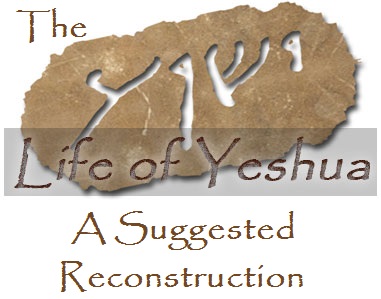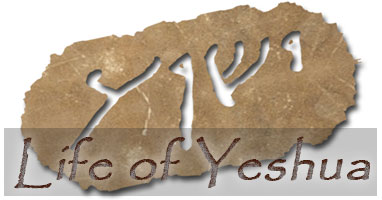How to cite this article:
David N. Bivin and Joshua N. Tilton, “LOY Excursus: The Kingdom of Heaven in the Life of Yeshua,” The Life of Yeshua: A Suggested Reconstruction (Jerusalem Perspective, 2014) [https://www.jerusalemperspective.com/13546/].

a

Detail of Rest on the Flight into Egypt, Master of the Mansi Magdalen (c. 1490 – 1530). Image courtesy of Wikimedia Commons.
.
Updated: 2 October 2022
A key concept in Jesus’ teaching is the Kingdom of Heaven.[1] The Kingdom of Heaven is the subject of many of Jesus’ parables and is at the heart of his proclamation. The Kingdom of Heaven has, nevertheless, frequently been misunderstood and misconstrued by numerous scholars. The Kingdom of Heaven is neither a place we can visit nor a time for which we must wait.[2] According to Jesus’ teachings, the Kingdom is not up in heaven, it is taking place here on earth. Likewise, for Jesus the Kingdom is not in the near or distant future, the Kingdom has already begun.[3]
Paid Content
Premium Members and Friends of JP must be logged in to access this content: Login
If you do not have a paid subscription, please consider registering as a Premium Member starting at $10/month (paid monthly) or only $5/month (paid annually): Register
One Time Purchase Rather Than Membership
Rather than purchasing a membership subscription, you may purchase access to this single page for $1.99 USD. To purchase access we strongly encourage users to first register for a free account with JP (Register), which will make the process of accessing your purchase much simpler. Once you have registered you may login and purchase access to this page at this link:
 Click here to return to The Life of Yeshua: A Suggested Reconstruction main page.
_______________________________________________________
Click here to return to The Life of Yeshua: A Suggested Reconstruction main page.
_______________________________________________________
- [1] For abbreviations and bibliographical references, see “Introduction to ‘The Life of Yeshua: A Suggested Reconstruction.’” ↩
- [2] Pace Schweitzer, who regarded the Kingdom of God as a purely eschatological concept. Cf. Albert Schweitzer, The Mystery of the Kingdom of God: The Secret of Jesus’ Messiahship and Passion (trans. Walter Lowrie; New York: Dodd, Mead and Company, 1914). For a critique of Schweitzer’s hypothesis, see Young, JHJP, 191-194. On the temporal aspect of the Kingdom of Heaven in Jesus’ teaching, see the subsection entitled “The Kingdom of Heaven in the Teachings of Jesus: Temporal Aspect” below. ↩
- [3] Pope and Buth stress that “the Kingdom of Heaven” is not a concept that pertains to the afterlife, i.e., going to heaven after you die. See Anthony Pope and Randall Buth, “Kingdom of God, Kingdom of Heaven,” Notes On Translation 119 (1987): 1-31, esp. 7. ↩

































































































Comments 7
I have some hesitation about Tilton’s understanding of the political aspects of the Kingdom of Heaven in Jesus’ teaching. Here are the reasons why.
The political chaos that swirled around Jesus—the desire for vengeance upon the Roman occupiers, especially in the Galilee, yes, even in Jesus’ own hometown synagogue, the inept Roman governors and evil Jewish kings, ethnarch and tetrarchs (such as Herod the Great and his sons, including Herod Antipas, ruler of Galilee)—makes Jesus’ reading of the Prophets in the Nazareth synagogue recorded in Luke 4:18-19 (Isa. 61:1-2; 58:6; especially his purposeful omission of “a day of vengeance of our God”), and his message to John in Luke 7:22 (= Matt. 11:5), stand out. In both places, in similar words, Jesus spelled out his agenda:
εὐαγγελίσασθαι πτωχοῖς…κηρύξαι αἰχμαλώτοις ἄφεσιν καὶ τυφλοῖς ἀνάβλεψιν, ἀποστεῖλαι τεθραυσμένους ἐν ἀφέσει, κηρύξαι ἐνιαυτὸν κυρίου δεκτόν
To preach good news to the humble…to proclaim release to the captives and sight to the blind, to let the oppressed go free, to proclaim a year of the Lord’s favor. (Luke 4:18-19; In this passage, Luke seems to be preserving Anthology.)
τυφλοὶ ἀναβλέπουσιν καὶ χωλοὶ περιπατοῦσιν, λεπροὶ καθαρίζονται καὶ κωφοὶ ἀκούουσιν, νεκροὶ ἐγείρονται καὶ πτωχοὶ εὐαγγελίζονται
The blind receive sight and the lame walk, lepers are cured, and the deaf hear, the dead are raised to life and the humble have good news preached to them. (Luke 7:22; Matt. 11:5; In this DT tradition, there is identical wording, with the exception of a few instances of καί.)
Jesus was not unaware that Israel’s liberation from foreign rule was inherent in the concept of redemption, but he ignored it. It distracted and detracted from the urgent necessity of getting more and more people under God’s reign.
While the winds of despair and rebellion engulfing the land of Israel swirled around Jesus, although he wasn’t a pacifist (see David N. Bivin, “‘Do Not Resist Evil’: Jesus’ View of Pacifism”), he never waivered in his belief that armed resistance to the Roman rulers was wasted time and energy—there were just too many dead, oppressed, lepers, blind, deaf and lame, in both the physical and spiritual senses. Now was the long-awaited time of salvation, and in spite of, and even because of, the political situation, the work of Jesus and his disciples was of extreme urgency.
In the midst of passionate cries for armed rebellion, in the midst of a deteriorating political situation, Jesus consistently proclaimed that now was the time of salvation and spiritual redemption. Jesus’ interest was in יְשׁוּעָה (yeshū‘āh, “help”), in the physical senses of this word, but more importantly, in its spiritual senses (“salvation”).
The kingdom that Jesus and his disciples proclaimed was not a political, nationalistic, or military kingdom, although some who perhaps had not listened long enough or closely enough to their message may have misunderstood it, taking “kingdom” in a political sense as meaning an armed struggle, and taking Jesus’ claim to be the long-awaited Messiah as a call to armed resistance. Rather, when Jesus and his disciples referred to “kingdom,” they meant a kingdom of personal surrender to a loving and benevolent God who brings down his rain on saints and sinners alike (Matt. 5:45), a kingdom of “righteousness, peace and joy in the Holy Spirit” (Rom. 14:17).
Jesus’ call to discipleship meant putting God’s Kingdom first in one’s life, even putting it above life itself. It meant being willing to die for the Kingdom, but Jesus’ “taking up your cross” did not mean joining the armed resistance. Jesus was likely talking about the difficulty of a disciple’s life of service to a sage (שימוש חכמים, shimūsh ḥachāmim). Davies suggested that “take up your cross” was a rabbinic technical term for following a rabbi as his servant (W. D. Davies, The Setting of the Sermon on the Mount [Cambridge: Cambridge University Press, 1964], 422ff.).
Although frequently Roman authorities, ignorant of Jewish custom and insensitive to Jewish religious feelings, caused civil disobedience, too often responsibility for outbreaks of violence could be laid at the feet of Jewish residents of the land of Israel who fell prey to human emotions and calls by zealots and terrorists for revenge on the Romans and throwing off of the foreign yoke. Inept Roman administrators and cruel and adulterous* Jewish kings, such as Herod the Great and his sons, made matters much worse, but it was those whose hearts Jesus’ message had not reached who, following their own human passions, indirectly contributed to the deaths of a huge part of the Jewish residents of the land, as well as the destruction of their Temple in Jerusalem. (*E.g., Herod Antipas, who married his half-brother [by the same father; Ant. 18:136] Herod’s wife, Herodias [Mark 6:17-18]. Herodias left her first husband, Herod [son of Herod the Great and Mariamme II] to marry his half-brother Antipas [son of Malthace the Samaritan]—not to marry Philip, as Mark erroneously reports.)
Jesus was well able to show righteous indignation, for instance, when he saw the commercialism and graft in the Holy Temple of God. He took aside the hawkers (from whose profits the Sadducean high-priestly mafia took a huge cut) and chastised them for their impious activities, saying, “It is written, ‘My house will be a house of prayer, but you have made it a den of thieves’” (Luke 19:45-46; cf. Isa. 56:7; Jer. 7:11).
Often, perhaps every year since his birth, as was the custom of his parents (Luke 2:41), Jesus had made a pilgrimage to the Temple. He noticed with pain the change that had taken place during his lifetime in the way the Temple was administered. Year after year graft and corruption increased. The Sadducean high priestly families, a cartel who controlled the income connected with the Temple, were indeed a mafia, eliminating anyone who was a threat to their profits:
Abba Saul ben Bothnith said in the name of Abba Joseph ben Hanan: “Woe is me because of the house of Boethus; woe is me because of their staves. Woe is me because of the house of Hanan; woe is me because of their whisperings [i.e., informing to the civil authorities, apparently]. Woe is me because of the house of Kathros; woe is me because of their pens.* Woe is me because of the house of Ishmael ben Phiabi; woe is me because of their fists. For they are high priests, and their sons are [temple] treasurers, and their sons-in-law are trustees, and their servants beat the people with staves.” (t. Men. 13:21; b. Pes. 57a)** (*H. Freedman’s note in Soncino English version: “With which they wrote their evil decrees.” **See Shmuel Safrai, “Insulting God’s High Priest,” sub-section “On the Sadducean High Priests and Their Families”; David N. Bivin, “Another Look at the ‘Cleansing of the Temple’ Story,” esp. footnote 10.)
Jesus was arrested by the Gentile slaves (Jewish halachah did not allow Jewish slaves) of the high priest Caiaphas (Matt. 26:3, 57), who instigated his death, bringing him to the Roman prefect Pontius Pilate on trumped up charges. Still later, the Sadducean priestly families persecuted Jesus’ disciples, executing, for example, Jesus’ brother James in 62 C.E. (Jos., Ant. 20:197-200). This execution took place during the high priesthood of Ananus the son of Ananus, greatly offending some of the Pharisees of the city (Jos., Ant. 20:201) who viewed James as a righteous man. (Note that Paul, equipped with letters of authority from the high priest in Jerusalem (Acts 9:2), was persecuting followers of Jesus, even traveling as far as Damascus [Acts 9:3ff.].)
The person who left the previous comment and I are in substantial agreement on a number of issues regarding the political aspect of the Kingdom of Heaven in Jesus’ teaching. Most importantly, the previous commenter and I agree that Jesus was not a zealot and had no intention of leading a military uprising. I believe that Jesus’ ethic of peacemaking and universal love was explicitly opposed to vengeance, hatred and violence. (See Joshua N. Tilton, Jesus’ Gospel: Searching for the Core of Jesus’ Message, esp. 73-79; idem, “Whole Stones That Make Peace,” WholeStones.org; idem, “Perfect Children,” WholeStones.org; “A Mile on the Road of Peace,” WholeStones.org.) We agree, as the commenter has it, that “The kingdom that Jesus and his disciples proclaimed was not a political, nationalistic, or military kingdom.” The commenter and I also agree that Jesus’ sermon in Nazareth was provocative precisely because Jesus did not call for vengeance upon the enemies of Israel. It appears that the school of Shammai, which dominated the Pharisaic party in the first century C.E., was closer to the nationalist populist center of the political spectrum in Jesus’ time. (For my view of the political spectrum in Jesus’ time, see Joshua N. Tilton, “Locating Jesus’ Place on the Political-Ideological Spectrum of Second Temple Jewish Society,” WholeStones.org.) It was not until after the destruction of the Temple that the Hillelite stream of Pharisaic Judaism became dominant. (See Shmuel Safrai, “Halakha,” in The Literature of the Sages: First Part: Oral Tora, Halakha, Mishna, Tosefta, Talmud, External Tractates [CRINT II.3; ed. Shmuel Safrai; Philadelphia: Fortress, 1987], 1:194-196.) Thus, Jesus’ anti-militant stance was probably a minority position in Nazareth, and may have seemed disloyal and unpatriotic to the members of the synagogue who listened to his sermon. Finally, I agree with the commenter that “Jesus’ ‘taking up your cross’ did not mean joining the armed resistance.” One did not have to be a militant Jewish nationalist to resent the injustice of foreign oppression. Twentieth-century disciples of Jesus such as Martin Luther King, Jr., Mother Teresa and Desmond Tutu prove that nonviolent religious movements can have a profound political aspect without attempting to topple governments by resorting to violence. (On a few of the sayings that challenge the commenter’s assertion that Jesus was not opposed to violence in principle [i.e., that Jesus was not a “pacifist”], see Joshua N. Tilton, “Whole Stones That Make Peace,” idem, “Perfect Children,” WholeStones.org.)
I believe our difference of opinion regarding the political aspect of the Kingdom of Heaven in Jesus’ teaching is one of nuance and emphasis. The commenter maintains that “Jesus was not unaware that Israel’s liberation from foreign rule was inherent in the concept of redemption, but he ignored it.” Thus, in the commenter’s opinion there appears to be a dichotomy between the political and the spiritual. Essentially, Jesus abandoned the hope of political liberation in favor of a spiritual experience of salvation. I regard the commenter’s alternatives as a false dichotomy, and maintain that one need not choose between the political and the spiritual dimensions of the Kingdom of Heaven. In other words, I believe that Jesus shared the yearning of his people for political liberation from the Roman Empire. Although I am convinced that Jesus rejected violent resistance, it appears to me that Jesus expected that God would miraculously bring about Israel’s redemption without weapons or bloodshed by means of his followers’ participation in the Kingdom of Heaven.
Israel’s liberation from the Roman Empire was, in my opinion, only one aspect of Jesus’ rich concept of the Kingdom of Heaven. Complete redemption would include the liberation of the whole creation from the power of Satan. Political oppression is only one manifestation of Satan’s reign, but there are others: fear, disease, ignorance, inequality, injustice, idolatry, sexual immorality and violence are all aspects of Satan’s reign that the Kingdom of Heaven dismantles. The rule of one people by another is inherently unjust, and is one of the evils that the Kingdom of Heaven addresses. Therefore, I cannot say that Jesus ignored the injustice his people suffered, and I have attempted to demonstrate that many of Jesus’ statements were critical of Roman imperialism.
It is true, as the commenter points out, that the Roman-appointed high priests caught up with Jesus before the Romans did. On the other hand, Antipas, the Roman-appointed tetrarch of the Galilee (Jos., J.W. 17:94), had been seeking to execute Jesus for some time (Luke 13:31), and when the high priests handed Jesus over to the Roman governor of Judea, Pilate executed Jesus as an enemy of the Roman state. I do not regard the fact that the pro-Roman high priests got to Jesus first as proof that the Roman authorities looked favorably on Jesus’ message, his movement, or his hope for redemption. It seems to me that the pro-Roman high priests understood the subversive political implications inherent in Jesus’ teaching on the Kingdom of Heaven and perceived that it struck at the basis of their power: the Roman military presence in the land of Israel.
Question about what Lindsey means in his article, “The Kingdom Of God: God’s Power Among Believers.” which is cited here.
Lindsey says, “It does not appear in the Scriptures, the literature created by the Essenes (the Dead Sea Scrolls)”
Did first century Jews refer to Qumran literature as, ‘Scriptures’? If so, could that help us understand what Paul is saying when he says in 1 Cor. 15:4 that Jesus died and rose again according to the ‘scriptures’?
Is Paul making a reference to a dying and rising Messiah type figure in Qumran literature, possibly in 4Q372? Or is Paul talking about tanakh?
See: “A Dying and Rising Josephite Messiah in 4Q372 DAVID C. MITCHELL”
https://drive.google.com/file/d/0B_s_DPpID_urN2N5VEdSdEVzaWs/view
Hi Joshua,
The full sentence from which you quoted provides the answer to your first question. In the Sidebar to Lindsey’s article, Safrai wrote: “It [i.e., the expression מַלְכוּת שָׁמַיִם (malchūt shāmayim, “Kingdom of Heaven”)—JNT] does not appear in the Scriptures, the literature created by the Essenes (the Dead Sea Scrolls), or in the Apocrypha and Pseudepigrapha.” In other words, there are three collections of ancient Jewish literature where “kingdom of heaven” does not occur: 1) Scripture, 2) Dead Sea Scrolls, 3) Apocrypha & Pseudepigrapha. So Safrai did not intend to imply that non-Essene Jews of the first century would have accepted Essene writings as Scripture. Whether the Essenes themselves would have considered (some of) their extra-biblical writings to be Scripture is another question, which is debated by scholars.
I think we can say with reasonable certainty that when Paul referred to Jesus’ dying and rising “according to the Scriptures,” the Scriptures he referred to are the Torah, Prophets and Writings he quoted in his letters. That being said, the Dead Sea Scrolls and other ancient Jewish sources offer us a glimpse into how the Scriptures were being interpreted and applied in the Second Temple Period, when Paul wrote his letters. These ancient Jewish sources can help us to understand how and why Paul and other early followers of Jesus interpreted the Scriptures in the (often surprising) ways they did.
Hope that helps.
Amazing article! Thank you.
I had a question about Yeshua’s comment about ‘if your righteousness doesn’t exceed that of the Pharisees …’
Could it be that this was Yeshua’s way of ‘putting a fence around torah’? In other words, he’s contrasting his halakah with that of the Pharisees’. Could he be saying that, ‘If you stop the yetzer ha’ra in the heart, you’ve gone one step further from the transgression of torah’?
In effect, having circumscribed the Pharisees fence of halakah by his own, he’s managed to make his teaching more desirous. So by saying that ‘unless your righteousness exceeds that of the Pharisees … you won’t enter my movement’. Is this some sort of rabbinic sophistication, maybe even a form of kal v’achomer which builds an argument that places the safeguard, which would prevent transgression, further from the safeguard his contemporaries proposed; thus undercutting their ruling and proving it is not as valuable?
Dear Joshua,
We’re so pleased to hear that you found our article to be helpful. A great deal of work went into it, so it is encouraging to hear that it is bearing fruit.
With respect to your question about righteousness that exceeds that of the Pharisees, I think your suggestion about kal va-homer might be on to something. I have a suspicion that Jesus’ statement about greater righteousness (Matt. 5:20) has to do with his exegetical approach in the Sermon on the Mount. There Jesus contrasts one a minimalist mode of interpretation with his own more rigorous approach. This is especially clear in his approach to the prohibition of murder (Matt. 5:21-22). Jesus opposed an approach that attempted to limit the scope of the commandment and advocated an approach that took the ethical spirit of the commandment and applied it even to and even wider set of circumstances. In Jesus’ view the prohibition against murder should not merely be read to determine how to punish murderers, but should regarded as laying down an ethical principle, vis. “all human beings are created in God’s image,” and therefore people must not be treated with contempt. Jesus expresses a similar approach when he says, “You give a tenth of your spices: mint, dill, and cumin; but you neglect the weightier matters of the Torah. You should practice the latter without neglecting the former” (Matt. 23:23).
A similar pattern to what is found in the Sermon on the Mount is attested in the early Christian work, The Teaching of the Twelve Apostles (or the Didache), which was based on a Jewish treatise which scholars refer to as the Two Ways. There we read, “Flee from all evil and everything that is like it. Do not be an angry person, for anger leads to murder. Nor should you be zealous or quarrelsome or hot-tempered, for from these murders arise” (Did. 3:2).
In the Sermon on the Mount and in the Jewish Two Ways we find an exegetical pattern which assumes that a light transgression will ultimately lead to a major transgression, much like the form of a kal va-homer argument.
For more on this topic, I recommend the following resources:
Serge Ruzer, “Antitheses in Matthew 5: Midrashic Aspects of Exegetical Techniques,” in The Sermon on the Mount and its Jewish Setting (ed. Hans-Jürgen Becker and Serge Ruzer; Cahiers de la Revue Biblique: Paris, 2005), 89-116.
Huub van de Sandt and David Flusser, The Didache: Its Jewish Sources and its Place in Early Judaism and Christianity (Minneapolis: Fortress, 2002), 193-237.
David Flusser, “‘It Is Said to the Elders’: On the Interpretation of the So-called Antitheses in the Sermon on the Mount” (jerusalemperspective.com).
Absolutely one of the best articles I’ve read. You both did an outstanding job of research and writing.